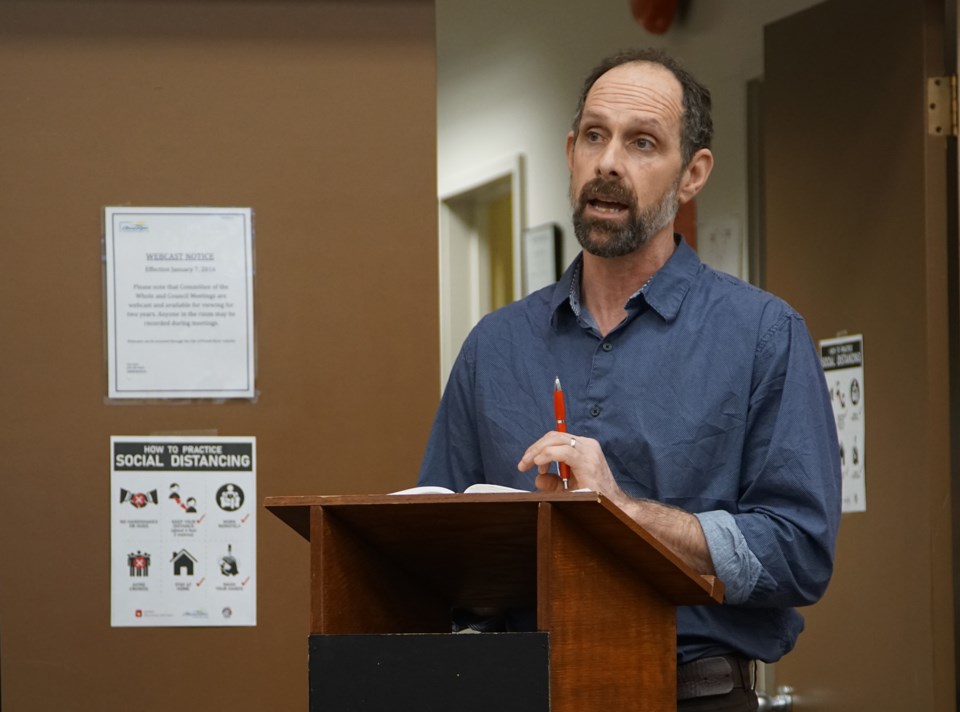City of Powell River councillors received an update on the COVID-19 pandemic and preparations in Powell River at its weekly council meeting on March 26.
Ryan Thoms, manager of emergency services, qathet Regional District, spoke regarding an emergency services update. He said the situation has been monitored for months now. He said it all started to change drastically about two weeks ago.
The declaration of a health emergency in British Columbia last week, and following that, the declaration of a state of emergency in the province, were significant days for those in local government, said Thoms. He said the regional emergency operations centre (EOC) was activated.
“At that point, emergency management BC was able to support us and open their provincial emergency centre in Victoria in support of us,” said Thoms. “It really took it up that extra notch.
“We followed our regional emergency plan and activated for the first time ever as a regional EOC. That’s significant. It didn’t come without challenges.
“We’ve been focused on the threats that are the highest priorities, such as wildfires, climate change and storms, but our emergency plan certainly recognizes pandemics.”
Thoms said the EOC has trained more than 50 city, regional district, and Tla’amin Nation staff and they are used to working together in a confined space.While long hours are being worked, it was never visualized trying to carry out the work remotely, which adds even more stress.
“That’s been the challenge getting it activated,” said Thoms.
He said what’s important to note is that they are following the BC emergency management system. Every emergency has a lead agency and the ministry of health is the lead agency with the pandemic. The EOC is following its direction.
“They’ve been really good with us throughout,” said Thoms. “There are coordination calls every day.”
He said efforts are also being made to coordinate more with Powell River General Hospital to see what local government can do to support them.
Thoms said a pandemic is not like dealing with a fire or a flood and evacuating people.
“The stresses are different in this one,” he said. “A lot of our efforts have been around public information. You’ve probably seen some of the great work that staff have been doing. It’s been everything from posting on social media and our websites and issuing the media releases. That is going to continue.”
Thoms said the EOC is operating every day at the direction of the three EOC directors and it will only expand from here.
“We are being advised that this is a marathon, not a sprint, so we are staffing accordingly.”
Councillor George Doubt said he thinks there has been a calm, coordinated reaction following the provincial government’s lead. He said he appreciates the daily updates that councillors are getting through the chief administrative officer from the EOC.
Doubt asked about essential businesses that are closing, although they are not required to close. He asked what the options are for keeping them operational. He said the laundromat in town has closed down and they are on the list of essential services in BC.
“Are there any supports or ways to keep those businesses open?”
Thoms said the pandemic is changing the rules by which a lot of agencies play and it doesn’t follow the same rules as a number of other emergencies.
“Between the province and the federal government, everyone needs to stay tuned and see what kind of reports there are,” said Thoms.
Councillor Jim Palm asked if there was enough personal protective equipment (PPE) in town.
Thoms said the question was on every emergency responding agency’s mind right now. He said there have been calls to identify who has what.
“In all of our conversations there is nobody raising a red flag that they are out of anything,” said Thoms. Efforts are being made to procure more PPE.
Councillor Cindy Elliott said there has been a lot of talk in the media about ventilator capacity. She asked Thoms if he knew what the capacity of the community is in terms of handling an outbreak in the community.
Thoms said he didn’t want to try to speak for the health authority and the hospital. He said the question about capacity is all about doing what’s required to flatten the curve, and then there will be capacity.
“We really take that seriously,” he said. “We don’t want to see what’s happened in Italy and other countries.
“Health around the province has done a lot to free up capacity, such as cancelling elective and non-essential procedures. It comes back to we as the public flattening the curve right now.”
Mayor Dave Formosa said he has asked the question about ventilators to the chief operating officer of Vancouver Coastal Health. He said the ventilators that are provided in Powell River are allocated on a per capita basis, just like everywhere else. Formosa said he was assured that there are extra ventilators, but it’s important to flatten the curve so that the city does not get into a situation.
“If people take the instructions seriously, it is going to help in that nature,” Formosa said.



